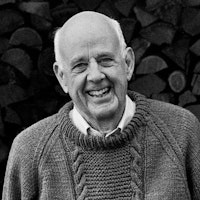I believe that the world was created and approved by love, that it subsists, coheres, and endures by love, and that, insofar as it is redeemable, it can be redeemed only by love.
Wendell Berry

Only By Love
Topic: Love, Compassion, & Kindness
I take literally the statement in the Gospel of John that God loves the world. I believe that the world was created and approved by love, that it subsists, coheres, and endures by love, and that, insofar as it is redeemable, it can be redeemed only by love. I believe that divine love, incarnate and indwelling in the world, summons the world always toward wholeness, which ultimately is reconciliation and atonement with God.
Wendell Berry was born in Henry County, Kentucky, on August 5, 1934. This region has not only been his lifelong home but also the inspiration for much of his writing. He grew up understanding the rhythms of the land, a knowledge that would deeply influence his roles as both a writer and a farmer.
He has produced a diverse range of works, spanning poetry, essays, and novels. A consistent theme across his writing is the connection between humans and nature, informed by his firsthand experience working on his Kentucky farm. As an academic, Berry taught English, further establishing his foothold in the literary community.
Beyond his personal achievements, Berry's family has played a significant role in his life. His close relationships, especially with those who share his ties to Kentucky, have further anchored his love for the land and community. While he has been a voice for sustainable farming and conservation, his writings also often touch upon the intricate dynamics of family and community life in rural America.
The Art of the Commonplace: The Agrarian Essays
Berry, Wendell. The Art of the Commonplace: the Agrarian Essays of Wendell Berry. Edited by Norman Wirzba, ReadHowYouWant.com, Limited, 2010, [Wendell Berry, The Art of the Commonplace: The Agrarian Essays].

Wendell Berry
Theme: Love

About This Wendell Berry Quotation [Commentary]
Love and the World We Live In by Wendell Berry
Additional Wendell Berry Poems and Quotes
Resources
Related Quotes
Copyright © 2017 – 2025 LuminaryQuotes.com About Us